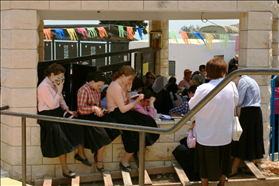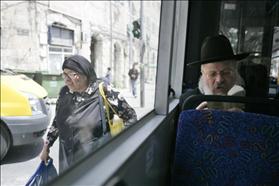Foreign Policy
U.S. State Department reports limitations on religious freedom despite opposition from most citizens
The U.S. State Department 2010 Report on International Religious Freedom sites increasing tension in Israeli society between secular and ultra-Orthodox citizens on issues such as housing allocations, military service exemptions and allocations for religious institutions of study. The report also lists a series of cases of violence against women in terms of extreme demands for modest dress and gender separation.
10/10/2011 17:06
Tags: United States · Religious freedoms

Orthodox women praying at Akiba ben Joseph's Tomb in Tiberias. 03.06.2008. Photography: Chen Leopold, Flash 90
The U.S. State Department 2010 Report on international religious freedom for the second half of the year states that Israel continues to discriminate on the basis of religion in both policy and law, against non-Jews and non-Orthodox Jewish movements. Among other things, the reports says that Israel “gives preference in the allocation of state resources for modern Orthodoxy and ultra-Orthodoxy, both their institutions and organizations.”
The report states that, “the government selectively implements limitations on freedom of religion.” However, “most of the Jewish citizens oppose this type of exclusive Orthodox control over the basic foundations of private life.” The report emphasizes the fact that non-Orthodox people living in Israel have received citizenship by virtue of a Supreme Court ruling, and despite this have been deprived of the right to marry and raise a family in Israel.
The U.S. State Department noted that according to a Bank of Israel report, the state has actually become more religious. Demographic shifts have caused increasing tensions between secular and ultra-Orthodox citizens on issues such as housing allocations, exemptions for yeshiva students from the army and “the fiscal burden for allocations given increasingly to ultra-Orthodox families who are eligible for special government subsidies for families with five or more children.” The U.S. State Department added that, “the U.S. government raises the issue of freedom of religion in its discussions with the Israeli government. The U.S. embassy expresses concern about issues of religious freedom in dealing with the [Israeli] Foreign Ministry, the Police and other government officials.”
Hiddush CEO Rabbi Uri Regev said in response that, “the U.S. State Department Report reveals to the world the sad fact that in the area of religious freedom, Israel is closer to radical Islamic countries than the western democratic world. There is no other civilized democracy in which there is such large-scale negation of the principle of religious freedom. The U.S. State Department describes precisely and at length how the Israeli government violates the rights to marriage, freedom of worship, respect for women, immigrants’ rights, rights of non-Jewish citizens and many other issues. It is difficult to seriously discuss social justice without freedom of religion and it’s time the Israeli government stop crushing it.”
According to Regev, “What leads to this shameful situation is the phenomenon of [religious groups] purchasing government submission in exchange for religious coercion, ignoring the will of the majority of the people in both Israel and the Diaspora. Civil party leaders must urgently begin to understand the need to establish a civil government that will act to promote Israel’s values as both a Jewish and democratic state. We are encouraged by the U.S. State Department’s interest in promoting religious freedoms worldwide, as a foreign policy interest of the United States.”
There is no other civilized democracy in which there is such large-scale negation of the principle of religious freedom.
The report details a number of violations of religious freedom in particular areas:
Dividing Lines - The report states that, “The public transportation company, Egged, which operates the majority of public transportation in Israel, continues to operate both intra- and inter-city lines in areas where there is an ultra-Orthodox population, allowing for the separation of men and women. Women that refuse to sit on their side of the bus on these lines risk harassment and physical assault by men.”
Street Segregation - On this issue, the U.S. State Department notes improvement: “In September 2010, the [Israeli] Supreme Court ruled that gender segregation on public streets and sidewalks in the ultra-Orthodox neighborhood of Mea Shearim in Jerusalem is illegal. This ruling stopped a tradition of gender segregation [in the streets] during the Sukkot holiday.”
The Western Wall - “Orthodox ‘Modesty Squads’ have tried to impose gender segregation in the past. In 2009, the plaza was designated ‘men only.’ Ceremonies in the Western Wall Plaza were cancelled due to the joint participation of men and women. There were incidents when ultra-Orthodox officials ‘harassed groups of visiting Jews worshipping at the Western Wall who did not uphold the Orthodox traditions.’” Along with this, the report also noted that, “signs in the Western Wall Plaza that request gender segregation in all areas of the plaza, not only in the areas reserved for prayer, were removed in 2010.” It does say that the broader public that visit the wall mostly ignore the demand for gender separation outside the designated prayer areas.
Violence - The U.S. State Department states that, “in previous years, ultra-Orthodox Jews in Jerusalem and concentrations of this group in other areas [of the country] would throw rocks on cars passing their neighborhoods on the Sabbath, sometimes assaulting and harassing women that, in their eyes, seem to be indecently dressed.”
Marriage and Divorce - “The only marriages officially recognized by the government are those conducted through the Orthodox Rabbinic Court.” The government, the report states, does not accept either civil marriages or those conducted by more progressive Jewish movements. Marriages of this sort “must be conducted outside the borders of Israel in order to be recognized by the state.” Also “Jews married in civil and non-Orthodox marriage ceremonies abroad will be able to divorce only through Rabbinic Courts or by courts outside the country. Non-orthodox converts cannot marry inside Israel.”
Burial - “The Chief Rabbi limits the right to be buried in Jewish cemeteries only to those who fit Orthodox standards. This excludes people who consider themselves Jewish, but have a Jewish father and a non-Jewish mother. This sparked public protest, especially with regards to cases of national disasters.” The report cites the example of the burial of victims of the Carmel Forest fires on Dec. 5, 2010 in military cemeteries. “One grieving mother protested vigorously, but ultimately succumbed to the Chief Rabbi’s decision to bury her daughter in a non-Jewish section [of the cemetery.]” With respect to civil burials, according to the U.S. State Department, “the Ministry of religious Affairs failed in its obligation to carry out alternative civilian burials according to a legal alternative from 1996 which gave individuals the right to be buried with a civil [not religious] ceremony. The Religious Affairs Ministry failed to implement the 1996 Alternative Burial Law, which established the right of any individual to be buried in a civil ceremony. This Ministry did not utilize any of the money allocated in the 2010 state budget for the development of civil, pluralistic, burial plots.

A Haredi man sitting on a segregated bus in Jerusalem. 17.05.2010. Photo: Abir Sultan, Flash 90
Harassment of non-Jewish Communities - The report lists in detail cases of violation of non-Jewish peoples’ rights. One example was the arson of a church in Jerusalem. “On Oct. 29, 2010, the basement of the Christian Union Church in Jerusalem burst into flames and the building was partially destroyed by the fire. Ten foreign volunteers were awakened and saved, though they did require care for smoke inhalation afterwards. The church, which serves both Christian and Messianic Jewish groups, in located in an area where there is a large ultra-Orthodox population. A large group of ultra-Orthodox people watched the fire, and four young people among the group congregated to watch the fire shouted loudly ‘let it burn.’” “Members of the ‘Jehovah’s Witnesses’ sect of Christianity reported assaults, threats and violence, as well as other crimes against their members, and noted difficulties they encountered when members of the community tried to persuade police to investigate or arrest the attackers.” The report emphasizes that although religious conversion is a legal act in Israel, state authorities are suspected of acting to damage the rights of missionaries in the Interior Ministry [that grants tourist visas]. 30% of the tourists intending to visit with missionary goals were subject to exceptional security interrogations at the airport and asked about their faith and their religious activities.
Discrimination against non-Jewish religious communities - “Israel does not recognize [the religious value of] important and established Protestant testimonials. Four different religious communities have petitioned the state for legal recognition, yet these petitions have remained unanswered for years: the Ethiopian Orthodox Church, the Egyptian Coptic Orthodox Church, the English Lutheran Church and the United Christian Council in Israel, an umbrella organization for a number of Protestant churches around Israel.”
To see the report in full, click here